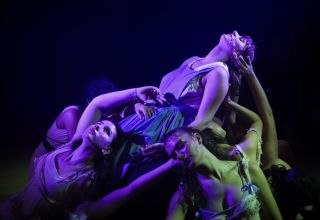Syria: teaching in a warzone
Academics at the University of Manchester awarded Syrian President Bashar al-Assad with the Notorious Belligerent Prize last week. He won for his “spectacular obtuseness and refusal to put anyone or anything before his personalised rule.” The accolade is intended as a “gentle way of mocking” the Nobel Peace Prize.
But, with reports of atrocities coming out of the country every day, for many the situation in Syria is deadly serious, including for one University of Manchester student who spent his summer on the frontlines of the civil war ravaging the country.
While most students were likely on holiday, or at home, Ibrahim Olabi was in his home country of Syria teaching law to militant fighters.
“I studied last year something called public international law,” said Olabi, a third year law student. “So I came across something called international humanitarian law, or known as the law of armed conflict, which regulates or tries to reduce the consequences of any war.
“Being from Syria I constantly think how I can apply this knowledge to my home country and how I can use this knowledge to its benefit.”
And apply he did. At the end of the last academic year, Ibrahim departed for Turkey, where he would cross the border into Syria and head for the northern city of Aleppo. During his nearly three month stay in the country he lived in an area under constant threat of attack, with next-to-no electricity, and suffering from severe food shortages, in order to establish what is the first organisation inside Syria training non-government fighters in the laws of war.
“It started with the idea of doing face-to-face seminars, so I would go speak to some leader in the Free Syrian army, explain the idea, and then ask him to get other brigades and battalions that may be interested,” Ibrahim told The Mancunion during an interview last week. “So a couple of days later we arrange a time and here I am giving a seminar to a group of fighters who are the ones taking decisions on the ground. Some were directly frontline people who had been called back for this training – I was impressed that the leader did that. He said ‘it is important for you guys to know these laws.’”
Ibrahim Olabi Photo: Peter ChinnockAfter his exams in June, Ibrahim visited a friend at Amnesty International in London and they identified the key topics he would need to cover in the IHL training in Syria; the treatment of detainees, summary executions (executions without a trial), child soldiers, and targeting civilians.
A research team of friends based in Manchester gathered material on the relevant laws and then worked to simplify them.
“There is no point for example in going into Navy warfare or warplanes, because the rebels, or non-state actors, do not have this kind of weaponry. So we identified the kind of laws that are relevant to the Syrian fighters, we’ve translated them and made them a lot more simplified,” he said. “Because there is no point in me going to a fighter and saying the ‘third Geneva convention clause number one states…’ and reading it like this, because it is a bit complicated.
“So we’ve simplified them into simple flowcharts of dos and don’ts and put them into a PowerPoint presentation. We sat with a couple of Muslim scholars so that we can focus on the overlap between international humanitarian law and sharia law, because that’s the way that you will be able to convince a lot of fighters.”
As well as straightforward classes, Ibrahim and associates in Syria developed short videos to help visually demonstrate the laws, which are currently being edited with the goal of broadcasting them on local television networks.
“For us to reach more people we created videos,” he said. “One-minute sketches that reflect these humanitarian principles. These videos are acted out, so we’ve got people in military costumes, real guns, real locations, real ambulances, real tanks, areas that were ‘missiled’ – real destruction – things that Hollywood would pay millions to get. The scenarios are either drama or action – at the peak of the drama or action the video stops and the relevant laws are read out on screen by someone.”
Ibrahim and his group, called the Syria Legal Development Programme, have also received help from academics in England, including University of Manchester law professor Mark Reiff, who praised Ibrahim’s work.
“He is really pretty amazing in what he is doing and the amount of effort he has been putting in,” said Reiff. “He is trying to help provide the rebels guidance on how to comply with the laws of way in a way that they trust more than with other more traditional international organisations.
“Most regular armies give their soldiers training in these laws, but as rebel groups are not regular armies they have to look elsewhere. The Red Cross and other international organisations have traditionally been the people who have done this.
“Ibrahim is providing to rebels the training soldiers in regular armies might get. And this is a good thing because the more people understand these laws the more likely they are to comply with them. It is in everybody’s interest.”
Ibrahim has been working in Syria since the uprising started working initially as a “media activist, so I would usually take CNN, BBC journalists, German newspaper journalists around to the frontline so they could get what they want, which they can’t do on their own due to the language barrier and they don’t know where to go.”
Having been travelling back and forth to Syria since the outbreak of war in 2011, Ibrahim has seen harrowing things he will never forget. One of the hardest experiences for him was when enemy snipers opened fire on a group of rebel fighters and he was powerless to help.
“I was on the frontline with a journalist and about fifteen fighters were running to storm a building,” said Ibrahim. “Sadly they didn’t know there were snipers on the other side and they crossed thinking it was clear and when they crossed they shot them all down. They didn’t all die, but they had to stay down.
“It is one of the most horrific things I have seen, because we can’t go out and get them because we will be shot at. There was fifteen or twenty of them, initially about only six died. By the end of the day they had all died, they bled out to death, because we couldn’t reach them.
“We tried everything, we tried burning tires to create smoke so the sniper wouldn’t see, but they would just fire randomly. So that was one of the most difficult scenes, because I could see them they were like one hundred metres away and one, he was looking directly at me and I was unable to do anything. It is a bit emotional. That was one of the most difficult things I’ve seen.”
The Assad regime continues to run a relentless bombing campaign against rebels, using fighter jets to attack at will. The constant threat has led Ibrahim to always be on alert when he hears the sound of a plane flying overhead, which is a habit that has been hard to shake, even back in Manchester.
“When I hear a plane I automatically go into cover, or at least check out what is going on. At Manchester Airport, I know I am at an airport so logically I will hear planes, but even though, I step out, I hear a plane and I go to cover. Its what happens if I hear fireworks or anything like that, there is an initial shock,” he said.
But, things in Syria have changed since the outbreak of fighting, when governmetn jets would fly day and night. Rebels began shooting planes down – now they only fly at night. This presents its own problems to deal with.
“[They] shoot at anything that has its lights on,” Ibrahim said. “You can’t see them and they have night vision. You can travel by care but you have to focus a lot; turn on the light, turn off the light, turn on the light, turn off the light so that if you get bombed there is a little bit of a margin of error – you might a escape.
“Also, there are lots of checkpoints in the city and they tell you to turn off your lights long before you reach the checkpoint because if they see a car stopping with lights on they will know there is a checkpoint down there and it will get bombed. Even at night, in the houses we try to dim the lights, if you had electricity of course.”
The next step for Ibrahim and the Syria Legal Development Programme is to try and register as a charity with the UK government and then start working on funding. The organisation has already has already received numerous emails from lawyers, law students, and other organisations looking to collaborate with them. Among the former is UNICEF, “they wanted to know more about what we were doing for child protection and how I was focusing on this issue,” said Ibrahim. “I told them about the program and they said they were happy to send me any materials they had, materials on laws. And they’ve got a lot of presentations they could send and were happy to offer legal consultation when it comes to questions that relate to children.”
“We also got approached by an organisation called Geneva Call, which is one of the largest organisations that deals with the legal training of non-state actors, it is made for this purpose. They have trained people in Palestine, Lebanon, and now they are trying to train people in Syria but it is difficult because they can’t get into the country easily because of bureaucracy or safety of staff and so on. So they got in touch with us and said how can we help, how can we cooperate.”
Ibrahim added that his teaching in Syria put pressure on him because the fighters take his what he says to be accurate, and that he was warned not to judge his students.
He said, “everything I say they take for granted, which puts huge pressure on me.
“Before I did this I consulted a group called Libyan lawyers for justice – I asked them about the psychology of tackling such seminars, because you need to be very careful and the most important thing that they told me was don’t judge them. Don’t ask them to tell you something that they’ve done, don’t give examples of breaches their comrades have made. Don’t make them feel judged…If they remember something they have done – a breach they have made – they will keep quiet about, but they will not do it again.
“I’m not taking their names, I don’t know who they are. It’s just me knowing one person who knows the rest and I’m speaking to them, and I’m with them at the frontline, we can get bombed together at the same moment and they appreciate that. So they were like ‘yeah sure, give us whatever knowledge you’ve got.’”







